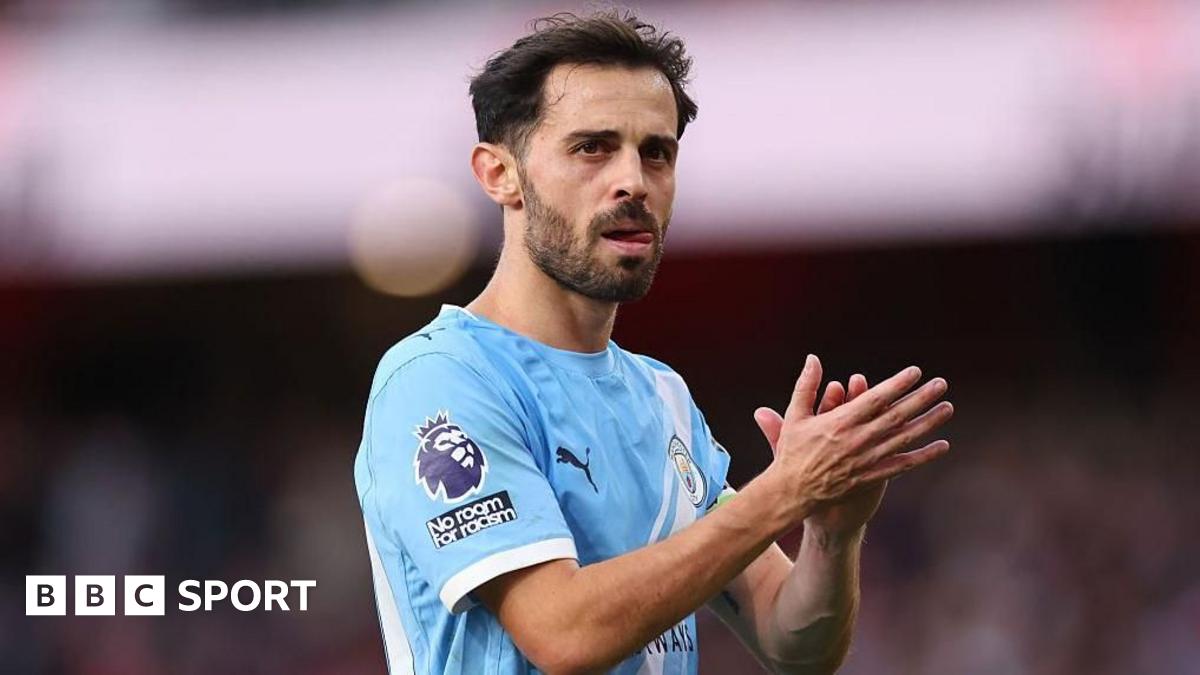Fixture Schedule Unfair to Man City – Silva
In the high-stakes world of the Premier League, where every point can tip the balance of the title race, Manchester City’s Bernardo Silva has voiced strong concerns over what he calls an unfair fixture schedule. Following a hard-fought 1-1 draw against Arsenal at the Emirates Stadium, Silva highlighted how the congested calendar left his team at a clear disadvantage, robbing them of vital recovery time. This clash, marked by Gabriel Martinelli’s dramatic stoppage-time equalizer, underscored the toll of midweek European commitments on domestic performance.
The match on Sunday was more than just a dropped point for City; it exposed deeper frustrations with the Premier League’s fixture schedule. City’s preparations were hampered by just 66 hours of rest after their commanding 2-0 victory over Napoli in the Champions League on Thursday. In contrast, Arsenal had enjoyed a fuller week, having secured a 2-0 win against Athletic Club in Bilbao the previous Tuesday. This disparity in recovery time meant City entered one of the season’s marquee fixtures physically drained, a factor Silva believes directly influenced the outcome.
Bernardo Silva’s Outrage Over the Fixture Schedule
Silva, the Portuguese midfielder known for his tireless work rate and tactical intelligence, didn’t mince words in his post-match assessment. It is not fair to play one of these games like this. It is just not right, he declared, emphasizing the impracticality of such tight turnarounds. For a player who logged an astonishing 62 appearances for club and country last season, the demands are all too familiar, but this instance felt particularly egregious.
The 29-year-old elaborated on the personal toll, revealing that he wasn’t feeling in a perfect condition to play like this. He argued that outsiders, those who haven’t experienced elite-level football, might underestimate the physical and mental strain. People who have not played at the highest level don’t know how it feels to play a game like this. You need to be at your best condition, Silva added. His comments resonate with fans and pundits alike, painting a picture of a star player pushed to his limits not by choice, but by scheduling constraints beyond his control.
This isn’t mere griping from a losing side—Silva was careful to frame it as a systemic issue rather than a conspiracy. I don’t think that they are trying to make us lose a game, he clarified, acknowledging the Premier League’s broadcasters and organizers. Yet, he urged for more empathy in high-profile encounters. It could happen to Arsenal or Liverpool in a few months. But when you are playing an Arsenal v City, or a City v Liverpool, or a Liverpool v Arsenal, you need to have a bit of common sense, and understanding of these situations.
Pep Guardiola Echoes Concerns on Fixture Schedule Demands
Manchester City’s manager, Pep Guardiola, backed his player’s sentiments, describing his squad as incredibly tired during the Arsenal match. Guardiola’s frustration with the fixture schedule is nothing new; back in January, he lambasted the English top flight for putting its teams at a disadvantage in European competitions. He pointed out how the league often slots the toughest schedules for the European teams in the important stages, a pattern that leaves clubs like City juggling Champions League heroics with Premier League marathons.
Under Guardiola’s stewardship since 2016, City have dominated domestically, winning multiple titles while navigating the rigors of Europe’s elite club competition. However, this success comes at a cost. The Catalan tactician has repeatedly called for reforms, arguing that the relentless pace erodes player welfare and competitive balance. In this case, the short turnaround after the Napoli game—City’s first Champions League group stage win—meant key players like Silva, Kevin De Bruyne, and Erling Haaland were operating on fumes. Haaland’s goal gave City the lead, but Arsenal’s resilience, buoyed by fresher legs, allowed Martinelli to snatch a point.
Guardiola’s broader critique ties into ongoing debates about fixture congestion across Europe’s big leagues. The Premier League’s 38-game slate, plus cup competitions and continental ties, totals up to 60-70 matches for top clubs. When midweek European fixtures clash with blockbuster weekend derbies, the strain intensifies. Critics, including the players’ union FIFPRO, have warned of burnout risks, with injury rates rising amid packed calendars. For City, this Arsenal draw—their first league stalemate of the season—serves as a stark reminder of how an unforgiving fixture schedule can level the playing field against fresher opponents.
Broader Implications of the Fixture Schedule for Premier League Rivals
The issue extends beyond Manchester City, affecting the entire elite echelon of English football. Liverpool, another Champions League contender, faces similar scheduling pitfalls, as do Arsenal once their European campaign ramps up. Silva’s point about reciprocity is spot-on: in a few months, the Gunners could find themselves in City’s shoes, decrying a fixture schedule that favors no one in the long run.
Historical data supports these complaints. Last season, English clubs collectively played more games than their European counterparts, leading to fatigue-related dips in form. The Premier League has made tweaks, like winter breaks, but critics argue they’re insufficient. The PFA (Professional Footballers’ Association) has pushed for fewer matches overall, perhaps by reducing cup replays or staggering European slots. Until then, players like Silva will continue to advocate for fairness, ensuring that talent and preparation, not arbitrary scheduling, decide the title race.
In reflecting on the Arsenal draw, Silva’s words cut to the heart of modern football’s challenges. The fixture schedule, while necessary for global broadcasting deals worth billions, must evolve to protect the stars who deliver the spectacle. As City push for another Premier League crown, incidents like this highlight the need for balance. Without it, the beauty of the game risks being overshadowed by exhaustion.
For Manchester City, the road ahead remains daunting, with more Champions League dates looming. Yet, Silva’s candid critique could spark meaningful dialogue, pushing organizers toward a more equitable fixture schedule that benefits all.
